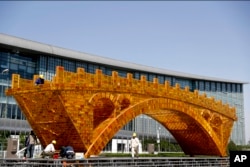Islamic State claimed Thursday that it had killed two captive Chinese nationals in southwestern Pakistan.
The Chinese language instructors, a man and a woman, were kidnapped at gunpoint two weeks ago from Quetta, the capital of violence-hit Baluchistan province.
A second Chinese woman accompanying them escaped the abduction while the gunmen were trying to force them in a vehicle.
There had been no claims of responsibility until Thursday, when the Syria-based terrorist group's global media outlet, the Amaq News Agency, announced the executions.
A provincial government spokesman, when contacted for comments, told VOA that authorities were looking into the reported claims.
The news of the alleged killings of Chinese nationals came hours after Pakistan's military released details of last week's operation against a major IS base in a rugged mountain range near Mastung, a volatile district about 50 kilometers south of Quetta.
Pakistani troops, including commandos, raided what was being described as headquarters of IS operatives in the province and killed 12 "hard-core" militants. The army confirmed that five soldiers were wounded during the three-day operation, which ended Sunday.
Sunni extremists
A military spokesman said the multiple cave complex spread over 10 kilometers was occupied by Lashkar-e-Jhangvi al-Alami, a Sunni extremist organization known for deadly attacks against minority Shi'ite Muslims in Pakistan.
The group used to be an al-Qaida loyalist, but Pakistani officials think it has lately been working to help IS establish a foothold in Pakistan.
IS has taken credit for several recent deadly suicide bombings in Baluchistan and elsewhere in Pakistan. The latest such attack took place last month in Mastung, which killed 25 people.
The military said the suicide bomber had been sent from the IS base that security forces neutralized last week. Pakistani officials have long insisted the Syrian-based terrorist group has no organized presence in the country, but a string of attacks and the army's destruction of the Mastung base contradicted officials' claims, critics say.
'Belt and Road' threatened
The army also released video footage of the IS base it raided. A bomb-making facility was destroyed, and security forces seized suicide vests, grenades, machine guns, sniper rifles, communication systems and 50 kilograms of explosives, according to an official statement.
Baluchistan, particularly its newly expanded deep-water port of Gwadar on the Arabian Sea, is at the heart of a $60 billion Chinese-funded "Belt and Road" trade and development initiative.
The China-Pakistan Economic Corridor, or CPEC, consists of a network of roads, rail links and power plants. It will ultimately link China's western Xinjiang region to Gwadar, giving Beijing the shortest trade access to the Middle East, Europe and Africa.
But as the work on CPEC-related projects has picked up, the Pakistani province has encountered an uptick in militant and separatist violence.
Thursday's announcement by IS, if confirmed, would increase worries among Chinese experts and workers associated with CPEC-related projects.






